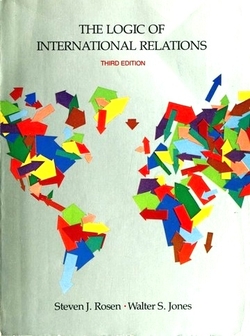Unquestionably, hiring Steven J. Rosen to become part of the Middle East Forum was the most difficult decision since I founded the organization in 1994.
 Steven J. Rosen (left) and Keith Weissman. |
The Washington Post noted that "Rosen helped pioneer 'executive-branch lobbying,' a style of advocacy that was not widespread when he began it in the mid-1980s, but is now a routine complement to the more traditional lobbying of Congress." The New York Times called him "brilliant, energetic and one of [AIPAC's] most influential employees, with wide-ranging contacts within the Bush administration and overseas." National Public Radio's intelligence correspondent found that he "helped shape [AIPAC] into one of the most powerful lobby groups in the country." According to Ha'aretz, writing about Mr. Rosen just after he left AIPAC, he "is not merely another AIPAC official; in the eyes of many, he is AIPAC itself."
 In addition, Mr. Rosen has an academic background, having taught at several universities (Pittsburgh, Brandeis, Australian National), headed Middle East issues for the RAND Corporation, and co-authored a best-selling textbook, The Logic of International Relations. So, he would fit right in our think tank.
In addition, Mr. Rosen has an academic background, having taught at several universities (Pittsburgh, Brandeis, Australian National), headed Middle East issues for the RAND Corporation, and co-authored a best-selling textbook, The Logic of International Relations. So, he would fit right in our think tank.
On the other hand, he (along with his AIPAC colleague Keith Weissman) stood accused by the Bush administration of breaching the ominously-named Espionage Act of 1917, and faced criminal charges that could have landed him in jail for years. Although he was not accused of spying, his (and our) opponents reveled in calling him an "accused spy"; and, of course, we worried about the ramifications for us if he were found guilty.
During extensive consultations with the MEF's board of governors, I found a consensus on wishing to bring on board so formidable an analyst in his hour of need mixed with apprehension about the criminal case.
Two developments resolved the dilemma for us in September 2008. Our study of the government's case convinced us of its injustice, shoddiness, arbitrariness, hollowness, and futility. Certain of Mr. Rosen's innocence, the lawsuit against him would not stop us from hiring him.
Second, world events kicked in. Seeing the Iranian drive to get the bomb as the single greatest danger both to the Middle East and to the United States (in the later case, via electro-magnetic pulse), we realized that the outgoing Bush administration would not take steps to stop the Iranian pursuit of nuclear weapons; and that Barack Obama, with his soft approach to Iran, would likely win the election.
Accordingly, the Forum in October 2008 began funding Mr. Rosen to work on ways to stop the Iranian march to nuclear weapons. He is ideal for the job, having begun efforts to stymie Iranian nuclear ambitions fifteen years ago – long before these became a general concern. Working behind the scenes, for example, he initiated efforts to develop leverage over Tehran through graduated economic sanctions by securing two presidential orders in 1995, followed by the Iran-Libya Sanctions Act of 1996 which laid the foundation for all subsequent efforts to bring economic pressure to bear against the Iranian government. He has been active in this arena ever since.
Following the inauguration, the Forum brought Mr. Rosen formally on board as a visiting fellow. In his brief time in this capacity, he initiated a Washington Project with his influential weblog, "Obama Mideast Monitor," and a new publication series called The Policy Forum. Notably, Mr. Rosen's blog started the chain of events that caused Charles Freeman to withdraw his name for consideration as chairman of the National Intelligence Council.
Then, on May 1, came the welcome news that the U.S. Department of Justice dropped its case against Messrs. Rosen and Weissman. In the words of the Washington Post, this decision amounted to "a stunning vindication" for them. Beyond that, it confirms the limits on arbitrary and prejudicial government actions.
I congratulate Messrs. Rosen and Weissman and, now that he is unburdened with legal woes, look forward to Steve's taking up the Iran portfolio with his full attention and renowned effectiveness.
The writer is director of the Middle East Forum and Taube distinguished visiting fellow at the Hoover Institution of Stanford University.
Oct. 28, 2024 update: Steven J. Rosen died today after a long illness.
